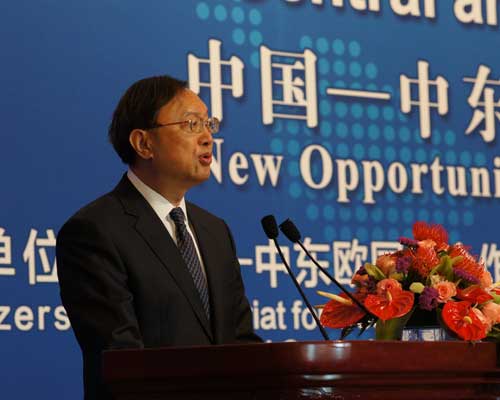A Closer China-CEEC Tie Sought through the Power of Think Tanks
cri
2013/12/20
By Ding Heng
The Diaoyutai Hotel in western Beijing has witnessed a comprehensive presentation of ideas and a heated discussion on how to further enhance relations between China and countries in Central and Eastern Europe (CEE).
A symposium which has attracted over 150 high-level think tanks from China and CEE countries was held on December 19th at the hotel.
The Chinese State Councilor Yang Jiechi addressed the opening ceremony and wished it a huge success.

Yang said the symposium is an important step forward based on the Sino-CEEC dialogue in the Romanian capital earlier this year.
Chinese Premier Li Keqiang paid a state visit to Romania in late November this year. A series of Sino-CEEC treaties on energy, infrastructure and trade have been signed when he was meeting with his CEE counterparts.
Yang hopes think tanks from both China and CEEC would contribute to closer Sino-CEEC ties by utilizing their utmost wisdom and intellect.
The top priority for today, as was pointed out by Yang, is to work out concrete measures to further enhance Sino-CEEC cooperation so as to improve the overall picture of the China-Europe cooperation.
Historically, there is a very friendly tie between China and CEE countries, which, however, seems to have failed to bring about enough Sino-CEEC cooperation today. Huge cooperative potential remains to be dug up in the future, according to the address delivered in the symposium by Liu Guchang, chairman of the China Foundation for International Studies.
Liu said that the current trading volume between China and all sixteen CEE countries weighs the same as that of Sino-France trade. Furthermore, Sweden alone is beating the entire CEEC region in terms of attracting Chinese investment.
"One very important reason for the disproportionately low amount of economic cooperation between China and CEEC is the on-going lack of mutual understanding" says Wei Jianguo, China's former Deputy Minister of Commerce.
As a Chinese university student back in the 1960s, Wei says, he had a very close and personalized relationship with CEE countries. Wei's experience, however, is no longer the case for most young people in China today.
"China's younger generation need to travel to Hungary to have a better understanding. It is the best place naturally in the world" says Gabor G. Fodor, director of the Hungary-based SZAZADVEG Foundation.
Fodor says more opportunities need to be created for investors and students from China, which should be the priority to his country.
The Diaoyutai Hotel in western Beijing has witnessed a comprehensive presentation of ideas and a heated discussion on how to further enhance relations between China and countries in Central and Eastern Europe (CEE).
A symposium which has attracted over 150 high-level think tanks from China and CEE countries was held on December 19th at the hotel.
The Chinese State Councilor Yang Jiechi addressed the opening ceremony and wished it a huge success.

Yang said the symposium is an important step forward based on the Sino-CEEC dialogue in the Romanian capital earlier this year.
Chinese Premier Li Keqiang paid a state visit to Romania in late November this year. A series of Sino-CEEC treaties on energy, infrastructure and trade have been signed when he was meeting with his CEE counterparts.
Yang hopes think tanks from both China and CEEC would contribute to closer Sino-CEEC ties by utilizing their utmost wisdom and intellect.
The top priority for today, as was pointed out by Yang, is to work out concrete measures to further enhance Sino-CEEC cooperation so as to improve the overall picture of the China-Europe cooperation.
Historically, there is a very friendly tie between China and CEE countries, which, however, seems to have failed to bring about enough Sino-CEEC cooperation today. Huge cooperative potential remains to be dug up in the future, according to the address delivered in the symposium by Liu Guchang, chairman of the China Foundation for International Studies.
Liu said that the current trading volume between China and all sixteen CEE countries weighs the same as that of Sino-France trade. Furthermore, Sweden alone is beating the entire CEEC region in terms of attracting Chinese investment.
"One very important reason for the disproportionately low amount of economic cooperation between China and CEEC is the on-going lack of mutual understanding" says Wei Jianguo, China's former Deputy Minister of Commerce.
As a Chinese university student back in the 1960s, Wei says, he had a very close and personalized relationship with CEE countries. Wei's experience, however, is no longer the case for most young people in China today.
"China's younger generation need to travel to Hungary to have a better understanding. It is the best place naturally in the world" says Gabor G. Fodor, director of the Hungary-based SZAZADVEG Foundation.
Fodor says more opportunities need to be created for investors and students from China, which should be the priority to his country.
